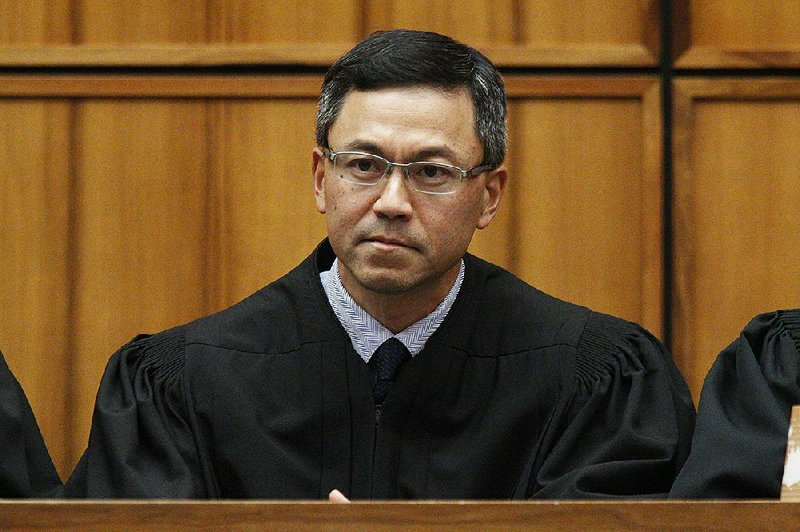HONOLULU -- A federal judge in Hawaii on Wednesday extended his order that blocks President Donald Trump's travel ban, keeping it in place until the state's lawsuit works its way through the courts.
U.S. District Judge Derrick Watson issued the written ruling Wednesday after hearing arguments from a government attorney urging him to narrow his block because Trump's proposed freeze on the nation's refugee program had no effect on the state.
Watson rejected that argument, preventing the administration from halting the flow of refugees.
In his decision Wednesday, Watson pointed to the president's own statements before the election, such as calling for a "total shutdown" on Muslims entering the U.S.
[PRESIDENT TRUMP: Timeline, appointments, executive orders + guide to actions in first 100 days]
"The court will not crawl into a corner, pull the shutters closed, and pretend it has not seen what it has," Watson said in his ruling. "The Supreme Court and this circuit both dictate otherwise, and that is the law this court is bound to follow."
Hawaii says the policy discriminates against Muslims and hurts the state's economy. The implied message in the revised ban is like a "neon sign flashing 'Muslim Ban, Muslim Ban'" that the government didn't bother to turn off, state Attorney General Doug Chin told the judge during arguments.
"Issue of animus has not been cured," Chin said. "It's been intensified."
The government says the ban falls within the president's power to protect national security. Hawaii has only made generalized concerns about its effect on students and tourism, Justice Department attorney Chad Readler argued Wednesday.
[U.S. immigration: Data visualization of selected immigration statistics, U.S. border map]
Participating by telephone, Readler asked Watson to be guided by narrower rulings blocking only the part of Trump's executive order that suspends new visas for people from six Muslim-majority countries.
Watson, an appointee of President Barack Obama, said the government argued only for the narrower interpretation after a federal judge in Maryland blocked the six-nation travel ban but not the suspension of the refugee program. That judge said it wasn't clear that the refugee freeze was similarly motivated by religious bias.
Watson noted that the government said 20 refugees had been resettled in Hawaii since 2010.
"Is this a mathematical exercise that 20 isn't enough? ... What do I make of that?" the judge asked Readler.
The government attorney replied that 20 is simply a small number of refugees.
"In whose judgment?" Watson asked.
Constitutional harm exists regardless of the number of people affected or for how long, Hawaii's attorney general said.
In his arguments, Chin quoted Trump's comments that the revised travel ban is a "watered down" version of the original.
"We cannot fault the president for being politically incorrect, but we do fault him for being constitutionally incorrect," Chin said.
Earlier this month, Watson prevented the federal government from suspending new visas for people from Iran, Libya, Somalia, Sudan, Syria and Yemen and freezing the nation's refugee program. That ruling came hours before the federal government planned to start enforcing Trump's executive order.
The judge had agreed with Hawaii that the ban would hurt the state's tourism-dependent economy and that it discriminates based on nationality and religion.
Trump at the time called Watson's ruling an example of "unprecedented judicial overreach."
The case is State of Hawaii v. Trump, 17-cv-00050, in U.S. District Court for the District of Hawaii.
In the Maryland case, a federal judge restricted his preliminary injunction to the section of Trump's order delaying the approval of new visas for people from the six countries for 90 days. The administration appealed that ruling, and the 4th U.S. Circuit Court of Appeals set a hearing for May 8 to consider it.
Trump's executive order, a revised version of an earlier travel ban, did prevail before a Virginia judge last week. The Hawaii and Maryland orders, however, took precedence.
Meanwhile, opponents of the travel ban are pursuing lawsuits in other courts. Late Tuesday, some Washington state residents asked for a March 2018 trial over their complaint.
The Justice Department balked, saying that "discovery and trial would thrust courts into the untenable position of probing the executive's judgments on foreign affairs and national security."
On Wednesday, the U.S. envoy to the United Nations, Nikki Haley, defended Trump's travel ban at the Council on Foreign Relations in New York.
She insisted it was not meant to exclude Muslims, but instead was intended to strengthen vetting procedures for asylum seekers. At one point, she cited this month's London terrorist attack as a justification for the travel ban.
The London assailant was a native-born Briton.
Information for this article was contributed by Jennifer Sinco Kelleher of The Associated Press; by Kartikay Mehrotra, Erik Larson and Andrew Harris of Bloomberg News; and by Somini Sengupta of The New York Times.
A Section on 03/30/2017
